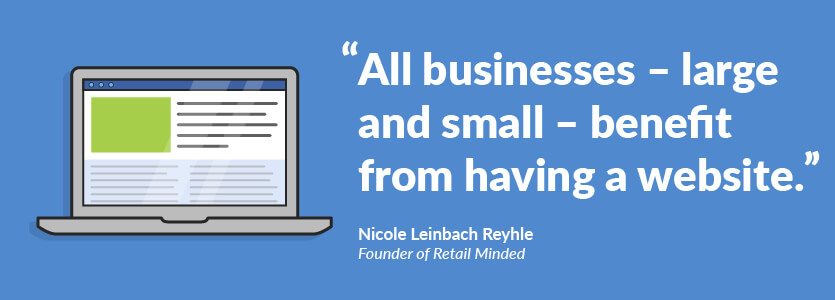You’re taking a friend out to a fancy dinner to celebrate their promotion. There are two new restaurants in town, so you decide to check out the reviews and glance over the menus before selecting.
Restaurant A has a website with reviews from customers, a PDF of the menu, photos, hours, and directions to make driving there easier. Restaurant B does not have a website. Which one would you choose?
Maybe you don’t think creating a website for your business should be a priority. In reality, websites benefit small businesses in more ways than one. Read on to learn why small businesses need a website.
Why small businesses need a website
Every day, people rely on the internet to give them quick access to information. Potential customers want to know about a business before they decide to buy from them.
Nicole Leinbach Reyhle, founder of Retail Minded, says, “Websites are no longer destinations for consumers to make purchases. They also serve as brand representations, offer informative insight such as customer reviews, product overviews, and contact information, as well as provide a digital home base for social media links and other online spots to point to. All businesses – large and small – benefit from having a website.”

There are many reasons why a website could come in handy at your small business. The following five responses answer, “Why do I need a website?”
1. To give information about your business
Websites should be able to answer questions that a potential customer would ask. Make sure your website has the following information about your business:
- Name of the business
- Information about your products or services
- Mission statement
- Hours open
- Address and map
- Contact information, such as a telephone number and email address
- Links to social media pages
- Simple and memorable domain name
- Other unique information about your business
- Reviews (optional)
- Blogs (optional)
Keep in mind that your name, address, and phone number (NAP) should remain consistent across your website. Be sure that every phone number or street address is current to drastically help your visibility in search engines when someone is seeking out your business.
2. To draw in customers
When you’re brainstorming how to bring in new customers and connect with current ones, creating a website for your business should be at the top of your list.
One reason why small businesses need a website is to tell customers about its company, products, and services. Include information like how you started your business and why your products or services surpass the competition.
Creating a review section can also draw customers. Make sure you keep relationships with customers strong so you can highlight glowing reviews to attract new customers.
3. To compete with other businesses
Your competitors might have websites up and running, which could cause potential customers to choose them instead of you. Having an unprofessional website can drive customers to a competitor as well.
Businesses rely on websites to post promotions, show off their products, and provide contact information. To stay ahead of the competition, create an easy-to-navigate website that is unique to your brand.
4. To make buying from you more convenient
Even if making internet sales isn’t your main objective, having a website helps customers connect with your brand whenever they want. Prospective customers use websites for more than just online purchases. Before buying, they want to collect information.
Your website is available all hours of the day. People can browse through your items even when your physical business is closed.
Starting a business blog could add value to your website. The blog should offer helpful and convenient tips related to your business. People searching for information could find your blog and, over time, end up becoming customers.
5. To promote your small business
Websites are indispensable advertisements for small businesses. They can also be cost effective and manageable. Many small businesses depend on easy-to-use, do-it-yourself websites that don’t require a design team.
Your website can be a gateway to other methods for promoting your business. Put links to your social media accounts on your website to promote your business on multiple fronts.
This is not intended as legal advice; for more information, please click here.
